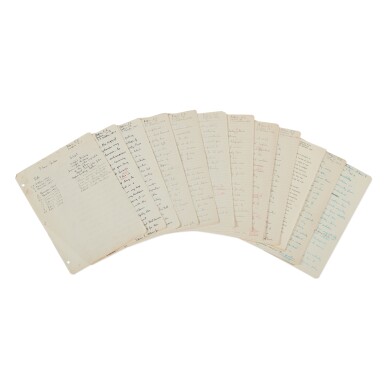Buzz Aldrin: American Icon
Buzz Aldrin: American Icon

Property from the Buzz Aldrin Family Trust
Buzz Aldrin's West Point Term Papers
Auction Closed
July 26, 06:15 PM GMT
Estimate
4,000 - 6,000 USD
Lot Details
Description
Collection of 15 West Point term papers.
69 pp. in total. 62 pp. autograph manuscript in BUZZ ALDRIN'S HAND. 5 pp. typed manuscript. 1 grading sheet, 1 note from a professor to "Cadet Aldrin." BUZZ ALDRIN'S manuscript notations, and professors' notations throughout.
Directly from the Personal Collection of Apollo 11 Lunar Module Pilot Buzz Aldrin
Buzz Aldrin entered the United States Military Academy at West Point in 1947. These 15 essays, written over the next four years (all but one by hand), demonstrate the intelligence that helped Aldrin graduate 3rd in his class of 475. They cover a fascinating variety of topics: football, the chemical properties of soap, science fiction, a day strolling along a beach boardwalk, the Communist threat to Europe, a character analysis of Satan in Paradise Lost, the responsibility of the individual in society, a semi-autobiographical look at the life of a fictional Montclair High School graduate and West Point cadet, and more.
Each essay has a handwritten “Aldrin, E E” or “Cadet Aldrin, Edwin E” at the top right of the front page (some on all pages), then is signed in full “Edwin E. Aldrin, Jr.” at the conclusion. (He did drop the “Jr.” after his first, or “plebe”, year.) Such signatures are rare, since by early childhood he was going by Buzz, and as an astronaut he fulfilled autograph requests in that manner. He had his name legally changed to "Buzz" in 1988. So it is only on a relatively few official papers from the middle of Aldrin’s life that one can find the “Edwin E. Aldrin, Jr.” autograph - as it appears on the metal plaque left on the moon by the crew of Apollo 11.
(Aldrin’s father had wished for him to attend the U.S. Naval Academy, and Buzz in fact received a senator’s appointment to that school. But he decided that West Point would provide a more direct path towards becoming a pilot - the Air Force was still part of the Army when Aldrin was making this decision - and after what Buzz later described as a “confrontation” with his father, the appointment was changed to West Point.)
“Theme Index”: a half-page table of contents that he wrote at the end of his plebe year, in the spring of 1948.
“Wishful Thinking”: a description of a football touchdown, showing writing techniques like “Contrast” and “Deduction”. (October 29, 1947. 1 page, in pen.)
“Wishful Thinking” (again): analysis of a football game. (It received the lowest grade of any of these essays!) (November 4, 1947. 1 page, in pen.)
“Behind the Report Card”: how to assess students. (November 21, 1947. 2 pages, in pen.)
“Be Clean or What?”: the chemistry of soap. (January 22, 1948. 4 pages, in pencil.)
“Lethal Snow”: scenario of an evil scientist dosing a snow cloud with radioactivity, killing thousands. (February 3, 1948. 4 pages, in pencil.)
“The Highway of Leisure”: a day at a boardwalk. Probably the most personal essay, clearly drawing on Aldrin’s fond memories of beach vacations - including “that new fad, miniature golf.” (February 17, 1948. 5 pages, in pencil.)
“Andrea Orsini: Destroyer of Unity”: a book review of Prince of Foxes, about Orsini of Italy. (March 5, 1948. 5 pages, in pencil.)
“Freedom vs. Chaos”: the Communist threat in Italy, and elsewhere. (April 19, 1948. 3 pages, in pencil.)
“Basic Communication”: how to speak or write clearly to make your point. (September 19, 1948. 2 pages, in pencil.)
“Character Analysis”: comparing Cyrano de Bergerac, and Satan as portrayed in Paradise Lost. (Rather cleverly, an analysis of which one deserves to be elected First Captain of the Corps of Cadets at West Point. (October 15, 1948. 5 pages, in pencil.)
“Ulysses, the Romantic Searcher”: analysis of a poem by Alfred, Lord Tennyson. (December 2, 1948. 5 pages, in pen.)
“What the Future Offers Us”: Aldrin describes science fiction in general, then concentrates on the play “R.U.R.”, which first used the word “robot.” He explains why so many people read science fiction: “wonderment of the stars and the future is truly an enjoyable experience.” (February 28, 1949. 5 pages, typed then signed in pen.)
“The Individual’s Freedoms in Society”: about the motives of individuals who brought controversial ideas into society, from Ibsen’s plays to Billy Mitchell’s plans for military airpower. (Aldrin’s father had served as Mitchell’s aide decades earlier.) (May 13, 1949. 5 pages, in pen.)
“To Each His Own (And May God Have Mercy)”: a work of fiction, but apparently quite autobiographical, since it is about a student from Montclair High School who receives an appointment to West Point from Senator Hawks… all of which described Aldrin’s experiences to that date. It includes some details about “Jim O’Connor’s” first two years at West Point, then predicts that he will spend years “taking that train ride home after an eight hour day at the office”... which did not describe Aldrin’s future experiences. He ties this all together with Frost’s poem “The Road Not Taken.” (On the back of the last page, he lists his class grades for that year.) (May 20, 1949. 5 pages, in pen.)
“Security as an Individual Responsibility”: this opens with a mention that the United Nations was formed to promote security from aggression. Just months before - while Aldrin was on a trip with other West Point cadets to Japan and the Philippines - the Korean War had begun, and U.S. forces had joined the United Nations effort against North Korea’s aggression. The rest is an analysis of different forms of insurance. (October 4, 1950. 5 pages, in pen.)
CONDITION REPORT:
To request a condition report for this lot, please email science@sothebys.com
